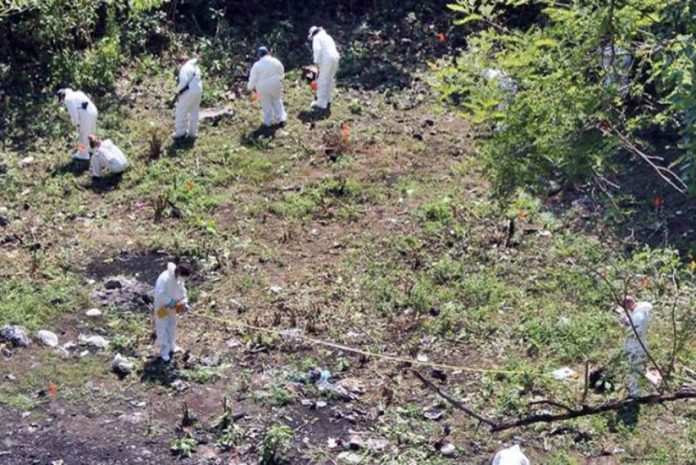The National Human Rights Commission (CNDH) has expressed its support for part of the federal government’s “historical truth” regarding the 2014 disappearance of 43 students in Guerrero, but remains critical of the overall investigation.
Presenting a report yesterday about human rights violations in the Ayotzinapa case, CNDH president Luis Raúl González Pérez said the commission agreed that bodies had been burned in the Cocula garbage dump, one of the more contentious claims by federal investigators.
“For the CNDH, there was a fire in the Cocula dump and the remains of at least 19 persons were found,” he said.
Experts have previously both rejected and corroborated the government’s claim that the students’ bodies were burned in a large fire.
González urged the federal Attorney General’s office (PGR) to conduct an exhaustive forensic investigation to determine if the bone remains found belonged to some of the 43 missing students.
He criticized the PGR for not already having conducted DNA testing on bone and teeth fragments found in both the dump and the nearby San Juan River.
González also called on the PGR to widen its investigation into the case because the bone evidence found doesn’t support the assertion that all 43 of the students’ bodies were burned at the dump.
According to the government’s “historical truth,” the students from the Ayotzinapa Rural Teachers’ College were intercepted by corrupt municipal police in Iguala, Guerrero, in September 2014 while traveling on buses they had commandeered to travel to a protest march in Mexico City.
The police then handed them over to members of the Guerreros Unidos gang who killed the students, burned their bodies in the Cocula dump and scattered their ashes in the San Juan river.
However, the government’s conclusion has been widely questioned both within Mexico and internationally and authorities have been heavily criticized for their handling of the case.
Many suspect that the army played a role in the students’ disappearance.
In June, a federal court ordered the creation of a truth and justice commission to undertake a new investigation, ruling that the one carried out by the federal Attorney General’s office (PGR) “was not prompt, effective, independent or impartial.”
The government, however, has failed to follow the directive.
González described the Iguala case as “abominable” and said truth was one of the victims.
What happened in Iguala in September 2014 is evidence of Mexico’s “profound deficiencies in public security and law enforcement and justice systems,” he said, adding that the investigation carried out by the CNDH “constitutes the closest approximation of the truth.”
The rights commission’s investigation confirmed the existence of clear links between authorities and organized crime as well as “the collusion and conspiracy of some federal, state and municipal authorities to create a favorable atmosphere for, to allow or to refrain from acting against such links.”
That collusion, the CNDH charged, caused the death of six persons and the disappearance of 43.
The CNDH said that the PGR must determine who “El Patrón,” or The Boss, is because, according to several statements, it was he who decided the ultimate fate of the 43 students.
Three men who were identified as being actual perpetrators of the crime – Agustín “El Chereje” García Reyes, Jonathan “El Jona” Osorio Cortés and Patricio “El Pato” Reyes Landa – were released from custody last month after a federal court judge ruled that 83 statements made by people accused of involvement in the students’ disappearance must be omitted from the investigation due to evidence that their human rights were violated.
González charged that high-ranking officials at the PGR also refused “on several occasions” to supply information to the rights commission about the case.
“. . . Authorities violated the right to truth of families and society by formulating and disseminating biased statements or partial or false information, which served to disorientate, confuse and generate uncertainty in public opinion, causing the victims to be revictimized,” he said.
González added that its 2,179-page report, entitled Recommendation No. 15VG/2018 “Iguala Case,” should serve as a “starting point and a clear guide of what’s still to be done” in the case.
The report, which contains 128 recommendations, says the CNDH has documented that at least 72 people accused of involvement in the disappearance of the students were tortured or mistreated by authorities.
The number is more than twice that cited by a United Nations report released earlier this year that said that there are “solid grounds to believe that torture was committed against” 33 men and one woman who were arrested in the case.
Interior Secretary Alfonso Navarrete Prida said the federal government would study the contents of the CNDH report to determine if it changes the “historical truth,” adding that its position would be made public in the coming days.
Today, however, is the penultimate day of the government’s six-year term, with president-elect López Obrador to take office Saturday.
Future human rights undersecretary Alejandro Encinas said the new government will accept all of the CNDH recommendations.
This week, López Obrador reiterated his commitment to create the court-ordered truth commission and today the director of the Centro Prodh human rights organization asserted that he would sign a decree to do so on Monday.
“We have been invited to the National Palace for the presentation of a decree to access the truth in the Ayotzinapa case, where President . . . López Obrador will begin to comply with the agreements he made with the mothers and fathers of the young men from Ayotzinapa,” Mario Patrón said.
The new government will investigate “everyone” involved in the disappearance of the 43 students, the president-elect declared on September 26 after meeting with the parents.
Source: Milenio (sp), El Financiero (sp)
